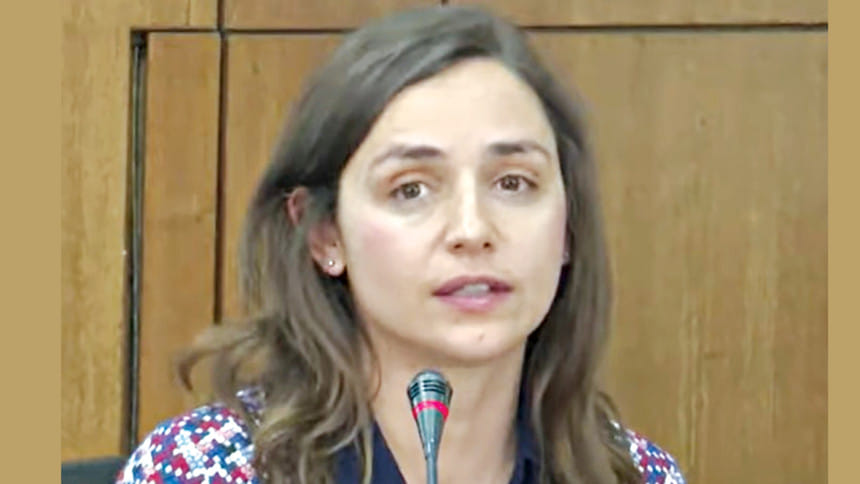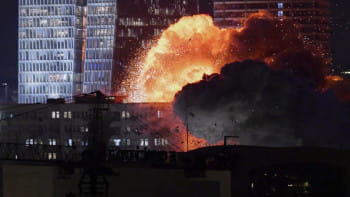There can be no justice if culprits hold power: UN

"I'm not surprised that families are afraid to file police cases if the person responsible for the disappearance is still in the same building."
If perpetrators remain in positions of authority, there can be no victim-centred prosecution, said the United Nations Working Group on Enforced and Involuntary Disappearances (WGEID) at a briefing in the capital yesterday.
The event, organised by the UN Resident Coordinator's Office at Bishwa Sahitya Kendra, was part of the working group's final day of a four-day visit to Bangladesh.
Speaking at the briefing, WGEID Vice Chairperson Dr Grażyna Baranowska, said, "We have heard many times here that perpetrators are in positions of authority, and this is the core issue that needs to be addressed.
"I'm not surprised that families are afraid to file police cases if the person responsible for the disappearance is still in the same building."
The group urged all law enforcement and security agencies to come forward with evidence that could aid the prosecution of enforced disappearance cases.
"To the police … We do not see how they are serving people and serving justice if they are not disclosing who the perpetrators are," said WGEID member Ana Lorena Delgadillo Perez.
"To the army … Collaboration is not just a word. It needs to be translated into action. You have evidence. Bring the evidence before the institutions investigating and prosecuting these cases."
She also noted that some military personnel accused of enforced disappearances were absconding. "We have not heard any logical explanation of how that happened."
Dr Baranowska said the WGEID had raised the issue of military involvement in enforced disappearances with the UN's Department of Peace Operations.
To this, Brigadier General Md Asif Iqbal, judge advocate general at the Army Headquarters, said, "There is a difference between the army and the Directorate General of Forces Intelligence [DGFI]. We must specify whether the act was committed by the army or the intelligence."
Major General Hakimuzzaman, a faculty member at the National Defence College, said the army often had no knowledge of what took place in other agencies unless such actions were officially reported or covered in the media.
"The Bangladesh Army is not involved in enforced disappearances. A handful of individuals on deputation to the DGFI and Rab were to blame," he said.
He further questioned the conditions under which certain individuals acted "inappropriately", noting that Rab and the Border Guard Bangladesh report to the home minister, while the DGFI and National Security Intelligence fall under the defence minister, who is always the head of government.
"Their channel of reporting was not the Bangladesh Army," he said, adding that intelligence agencies operate in a highly compartmentalised manner.
"Many army personnel have undergone trial and been punished when reported by those organisations, the media, or others. In many cases, the army has unilaterally withdrawn personnel and taken necessary action."
Asked by this newspaper whether any individuals had been held accountable specifically for enforced disappearances, he responded in the negative.
"If we [the army] can earn the trust of the people by standing with them during floods, how can the Bangladesh Army act against its own people?" he asked.
He proposed that retired army officials be included in the Commission of Inquiry on Enforced Disappearances and the International Crimes Tribunal to make them more "inclusive".
Meanwhile, Sharmin Akhter, superintendent of police at the Police Headquarters, reaffirmed the force's commitment to investigating enforced disappearances.
The UN working group further stressed that victims need justice through a fair and credible process.
"What the families and victims need are sentences that will be kept; sentences that are brought in a fair trial and that will stand the test of time," said Dr Baranowska.
She cautioned that while some families demand swift justice, rushing trials could compromise fairness. "Sentences that can later be revised would be detrimental to everyone."
The team welcomed the possible extension of the current commission's tenure until the end of the year, but stressed that other mechanisms should also be used to resolve individual cases.
"There are search mechanisms beyond this commission that would help solve individual cases, which is not the core mandate of the commission but it is a task that needs to be achieved," said Dr Baranowska.
The team also noted the long-term harm inflicted on victims, who often face job loss, ruined education prospects, and years of legal harassment following their illegal detention.
It called for a review of the country's counter-terrorism legislation.
Golam Mortaza, a survivor, shared how he was picked up by Rab in 2010 and forcibly disappeared for a month.
"My lip had split open from the beatings, and it was sewn back up without anaesthesia. They clipped crocodile clips to my genitals and tortured me with electric shocks. I could smell my flesh burning."
He described being hooded at all times, kept in a five-by-ten-foot cell with no hygiene facilities, and being deprived of food to the point that he lost 20kg in a month.
Released on the condition that he remain silent, Mortaza still endured eight more months of incarceration under various legal cases.
Mahdi Amin, policy adviser to the acting BNP chairperson, said the party believes in a Bangladesh where no one is subjected to human rights violations.
"The party's grassroots has suffered tremendously because of enforced disappearance," he said, pledging to continue efforts to locate the missing.
Tasnim Jara, senior joint member secretary of the National Citizen Party, said her party envisions the formation of a permanent commission of inquiry -- not only for justice, but for closure.
"Every case must be investigated for closure, and we must have a mechanism to recover records that have been destroyed. If case records can't be accessed, the command chains must be investigated," she said.
The WGEID concluded by emphasising that this was only the beginning of its collaboration with the country, stating that it will be issuing recommendations to the Bangladesh government in the coming days.

 For all latest news, follow The Daily Star's Google News channel.
For all latest news, follow The Daily Star's Google News channel. 






Comments